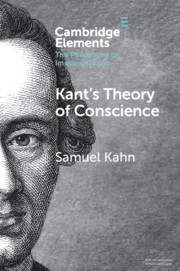
-
Select format
-
- Publisher:
- Cambridge University Press
- Publication date:
- April 2021
- May 2021
- ISBN:
- 9781108694278
- 9781108717359
- Dimensions:
- Weight & Pages:
- Dimensions:
- (229 x 152 mm)
- Weight & Pages:
- 0.118kg, 70 Pages
- Series:
- Elements in the Philosophy of Immanuel Kant
You may already have access via personal or institutional login- Series:
- Elements in the Philosophy of Immanuel Kant
Book description
The main body of this Element, about Kant's theory of conscience, is divided into two sections. The first focuses on exegesis of Kant's ethics. One of the overarching theses of this section of the Element is that, although many of Kant's claims about conscience are prima facie inconsistent, a close examination of context generally can dissolve apparent contradictions. The second section of the Element focuses on philosophical issues in Kantian ethics. One of the overarching theses of this section of the Element is that many positions traditionally associated with Kantian ethics, including the denial of moral luck, the nonaccidental rightness condition, and the guise of the objectively good, are at variance with Kant's ethics.
References
Metrics
Altmetric attention score
Full text views
Full text views help Loading metrics...
Loading metrics...
* Views captured on Cambridge Core between #date#. This data will be updated every 24 hours.
Usage data cannot currently be displayed.
Accessibility standard: Unknown
Why this information is here
This section outlines the accessibility features of this content - including support for screen readers, full keyboard navigation and high-contrast display options. This may not be relevant for you.
Accessibility Information
Accessibility compliance for the PDF of this book is currently unknown and may be updated in the future.


